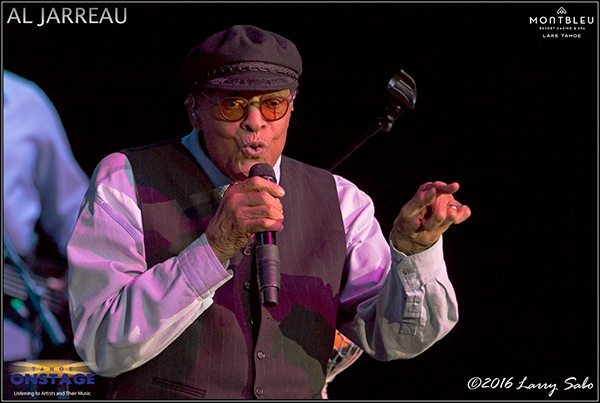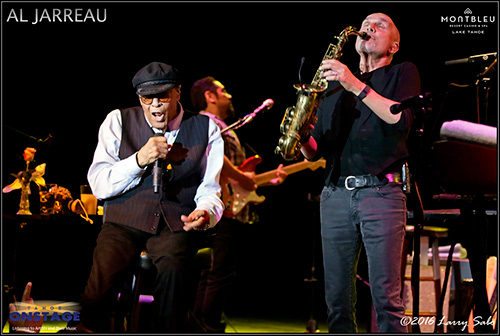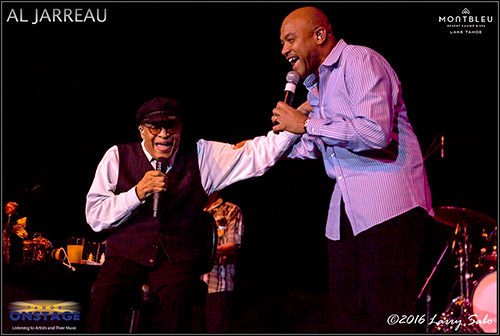
Tahoe Onstage photos by Larry Sabo
In his 1980 song “Never Givin’ Up,” Al Jarreau sings, “I’ve been afraid that I had missed the chance of a lifetime.” He, of course, didn’t miss the chance.
The jazz, pop and R&B singer fondly called “The Acrobat of Scat” died Feb. 12, 2017, at the age of 76. He died after being hospitalized in Los Angeles last week for exhaustion and had announced that he would stop touring.
One of his final performances was Sept. 17, in the MontBleu Theatre at the south shore of Lake Tahoe. In October, Jarreau received the Lifetime Achievement Award from Wisconsin Foundation for School Music.
Jarreau viewed his life as a journey on the Yellow Brick Road, and, like “The Wizard of Oz” characters, courage, compassion and intellect led to that award. During a September conversation with Tahoe Onstage, he also displayed humility and congeniality. Very quick with a joke and laughter, the jazz legend clearly was soaking up each minute.
“I am continuing to write and tour and perform and I’m just glad as can be, thankful and praying and preaching every day,” Jarreau said in a telephone interview. He lived in California, but his roots were in Wisconsin, and there’s no place like home. He received the Lifetime Achievement Award on Oct. 8 in Milwaukee at the Pfister Hotel, where Jarreau had some of his earliest professional performances.

“There’s another little connection that is part of my Yellow Brick Road,” he said. “The Pfister Hotel is one of those beautiful old European style hotels with columns and stairwells and it looks like something out of the Titanic. Just an elegant place. And that was one of the first places I sang music with a trio. The owner was a guy named Ben Marcus. His first movie theater was the Ripon campus movie theater. They are part of my Yellow Brick Road, the Pfister Hotel.”
Now a huge publicly owned chain of theaters and resorts, the Marcus Corporation was founded in 1935 at the movie theater on the Ripon College campus, located about 75-minutes north of Madison. That’s where Jarreau earned his first degree, a bachelor of science in psychology.
“I went to Ripon because as a high-schooler in the 11th grade I was invited to go that campus and be part of something called Badger Boys State, which is a practice in state and local government,” he said.
The charismatic teenager was elected governor of Badger Boys State, which earned him a scholarship at the private liberal arts college. Jarreau and his Fort Atkinson High School basketball coach both came to Ripon at the same time. Jarreau may have broken the color barrier on the team in 1958 but apparently there was little made of it. Ripon Sports Information Officer Mike Westemeier could not confirm whether Jarreau was the first African-American to play basketball at Ripon. Nor could Jarreau.
“There weren’t many and it wouldn’t be absolutely wrong to say that I was the first African-American to play basketball there,” Jarreau said. “I couldn’t tell you the names of other African-American basketball players at Ripon, so I might have been very close to the first.”
Kermit “Doc” Weiske, Jarreau’s high school and college coach, taught the young man about courage, persistence and confidence.
“He had a fondness for me and sat me down when I was about to not play basketball anymore,” Jarreau said. “He said, ‘Stay, Al. Stay. Keep on.’
“We met in his office another time and it was just after I’d lost my scholarship. I was not a good candidate academically for Ripon. Not at all. I’d never had a foreign language in my life. I took a year of practical math. When I went to Ripon, I could read OK. I knew three-syllable words I could pronounce as well, but man, there were some pretty high-powered classroom situations that I went into at Ripon and I was flunking everything. I lost that scholarship and was heading home, and Doc stepped in and said, ‘Huh-uh. Take my hand, young man. Come play basketball young man and I’ll get you a job on campus and you stay here, Al.’
“You are going to tear me up now,” Jarreau said during the interview. “I loved him and he was fond of me, and my experience at Ripon was fabulous.”
Doc Weiske died last March but he left such an indelible mark at the school that there is a plan to name a newly renovated basketball arena after him.
Also making an impression on Jarreau was a Feb. 4, 1959, concert at the campus by Dave Brubeck and his bandmates, Paul Desmond, Joe Morello and Gene Wright.
“Of course it was inspiring,” Jarreau said. “Not because they were singers. They weren’t. Because they were musicians playing the music in front of an audience that appreciated what they did and they were at the top of their game. … I can see it in my head right now.”
Jarreau later famously sang and recorded a scat version of Brubeck’s song “Take Five.”

Jarreau had his own singing group in college, The Indigos, which included fellow 1962 graduate Peter Bock, who became a renowned NASA scientist. Music was Jarreau’s first love, but after graduating from Ripon he continued his education at the University of Iowa, where he earned a master’s degree.
With encouragement from his parents, he sang as often as possible.
“They knew it was in me to sing,” Jarreau said. “ ‘Don’t stop singing. Do it because you love it. If it turns into a career, how lucky you will be. But sing, Al. Sing.’ My dad came to see me sing as I came into club situations. He was a minister — a man of the cloth — and he would go there and drink orange juice and breathe cigarette smoke, but he encouraged me to sing. Whenever I said, ‘There’s my dad over there. Hi dad,’ he would stand up and take a bow. It was too funny. It was a real obvious bow. ‘Yes, I taught him everything he knows, and that’s my boy.’ ”
After completing his advanced degree in vocational rehabilitation, Jarreau fortuitously landed a job as a social worker in the San Francisco Bay Area, where he moonlighted at a club called the Half Note in a jazz trio that included George Duke.
“I was working as a rehab counselor … and it just became obvious that I had to choose a direction,” he said. “It was just too big for me with so many people to try to help. It felt like I was walking in quicksand. So I was either going to move to a different agency and continue work as a counselor, or I was going to do the music full time.
“What pushed that decision was the Half Note where George and I had been doing music for about three years was about to close. I made the decision I could have made several years before. Music was my first love. It was my first avocational love. I’d been making a buck or two since I was 8, 10 years old. Singing in the church, singing on the street corner, singing in the high school. Singing anywhere anyone would give me a chance to let me sing.
“It was almost that I didn’t have a choice. It was that kind of love. When you get infected with that bug, it’s something you are going to do, whether you get paid for it or not. And I decided, well, I think I can make a living. And off I went.”
Jarreau played in a duo with pianist Tom Canning in 1975 was signed by the Warner Bros. He gained huge popularity in Germany, where he started playing in a Hamburg club, a spot where The Beatles also had ascended. His broke another barrier in a well-documented career, busting out of being solely considered a jazz artist. He has received seven Grammy Awards in jazz, pop and R&B.
He has numerous philanthropic endeavors supporting youth and education, and the student who nearly flunked out of Ripon College has honorary doctorates from both the University of Wisconsin-Milwaukee and Berklee College of Music in Boston.
In recent years, Jarreau doubtless has reflected on his lifetime of achievements. He was hospitalized in 2010 for respiratory issues, and in 2013 lost his dear friend George Duke to leukemia. Exactly a year after Duke died, Jarreau released an album, “My Old Friend: Celebrating the Life of George Duke,” which included 10 of Duke’s songs plus Jarreau’s homage “My Old Friend.” Gerald Albright, Stanley Clarke, Boney James, Lalah Hathaway and Jeffery Osborne were guest artists.
Jarreau continued to challenge himself his entire life.
“It’s constant; something is always in the works,” he said. “I’m writing a lot. I am getting ready for the next new record and I’m not sure what it’s going to be. I’ve got a list of songs that’s pretty good and I’ll get in there and do a next new project for Concord Records. In the meantime, I’m getting ready for a (Duke) Ellington Program with the Norddeutscher Rundfunk, a radio band that has been around 65 years playing jazz, America’s music, and they play it like they were born in Chicago.”
For many of his performances, Jarreau returned to the duo format, playing with longtime bandmember and fellow Milwaukee native Joe Turano. For the Tahoe show, Jarreau was accompanied by Turano on keyboard and saxophone, Chris Walker on bass, Mark Simmons on drums, John Calderon on keys and Larry Williams on flute.
Looking back on his life, Jarreau had one lament. He should have made more live recordings. The artist said he prefers to play live rather than in a studio.
“That’s the original form of musical communication and there is just something about it that’s irreplaceable,” he said. “It’s wonderful that we get to record and it goes out to the rest of the world so they can have that experience in their living room that attempts to duplicate the live situation. But there ain’t nothing like being able to reach out and touch a person’s hand who is in the front row, smell their perfume and see the color of their eyes.
“That’s the shit, Holmes. And you can tell them I said it.”
Here is a link to photos from Al Jarreau’s concert at Lake Tahoe in September. PHOTOS
Statement from Al Jarreau’s website:
Al Jarreau passed away today, February 12, 2017. He will be missed. A few days ago, I was asked to describe Al to someone who knew of his success, but did not know him as a person. I responded with this: His 2nd priority in life was music. There was no 3rd. His 1st priority, far ahead of the other, was healing or comforting anyone in need. Whether it was emotional pain, or physical discomfort, or any other cause of suffering, he needed to put our minds at ease and our hearts at rest. He needed to see a warm, affirming smile where there had not been one before. Song was just his tool for making that happen. A few things I think he would want mentioned right now: To Al’s wife, son, sister, brothers, and family: You allowed Al to share himself with the world. He was grateful that you gave him that gift. He knew it was difficult, and regretted that more than he could explain. Please know that your gift was to us, too, and that we are also grateful. To everyone who attended his concerts, and listened to his albums: He needed you, and you always were there for him, for more than 50 years. He was thankful for you every day, and did his best to show that to each of you. To his band, and to the many, many talented musicians, writers, composers, and arrangers who played and collaborated with Al over the years: You enabled, supported, and thrilled him. He treasured you, and considered you brilliant. He loved sharing the stage with you, and was honored that you shared it with him. To each promoter, presenter, and producer: Thank you for your faith in him. Your commitment to Al was both essential and endless, and he never took you for granted. To his agents, managers, crew, counselors, publicists, and journalists who supported his work, and also to all of the airline, hotel, venue, and other people who hosted him like royalty: He noticed every bit of the dedication and effort that you unselfishly provided, without limits. And, he appreciated you completely. To young people everywhere, especially the musicians he was grateful to meet at school workshops, musical competitions, residencies, and at concerts: From you, Al asks a favor. Please find any artistic thing that you can do with passion, and do it. With art in your life, you will be a better family member, neighbor, friend, and citizen. Finally, to Al Jarreau: Thank you Al, from all of us. You completed your ministry in a beautiful and gracious way. Godspeed… you’ve earned it.
